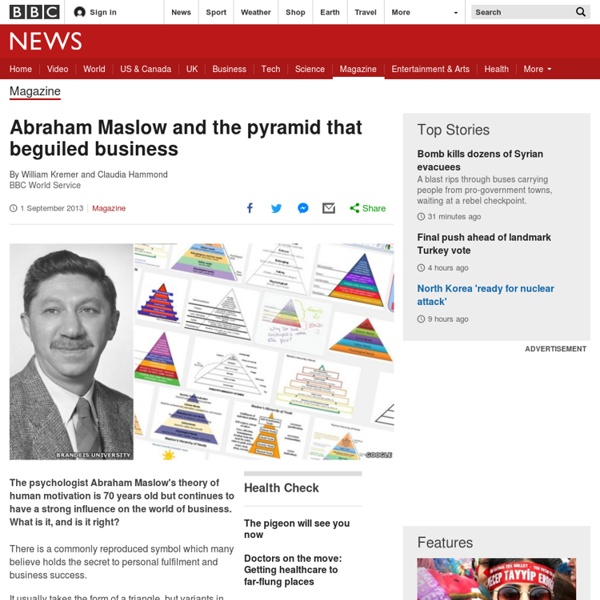Abraham Maslow and the pyramid that beguiled business

From heart rates to surveys: How to keep workers happy
12 August 2013Last updated at 19:06 ET By Nastaran Tavakoli-Far Business reporter, BBC News Happy happy joy joy: If your staff don't appear to be quite as bubbling over with enthusiasm as this lady is you might want to work out why - and do something about it before profits fall Amy Balliett had a problem brewing in her company that she was entirely unaware of. An employee was trying to encourage others at design firm Killer Infographics to leave the Seattle-based start-up. With a small workforce of 20 and an open plan office, Mrs Balliett thinks staff might have found it hard to come forward and tell her what was going on. But a programme called TinyPulse allowed some employees to tell her - anonymously. It allows bosses to gather weekly surveys from their workers, and provides a channel through which workers can raise issues and communicate with their bosses. Mrs Balliett says retaining workers is key to growth in a start-up like hers, so she has to keep them happy. Unhappy workers leave
Brave new work: Making the 9-5 somewhere you want to be
11 July 2013Last updated at 18:54 ET By Fiona Graham Technology of business reporter Working 9-5: If you start counting the clock from the moment you slump behind your desk you're not alone - 70% of US workers, and many many more people around the world are right there with you Are you happy at work? If that seems like a loaded question - can you at least say you're interested in what you're doing, and feel motivated? If the answer is no, don't worry. So what can we do about it? Break clause Dave Coplin has a few ideas. He is Microsoft UK's chief envisioner. It's something he's passionate about, and that comes across clearly in his new book Business Reimagined: Why work isn't working and what you can do about it. Dave Coplin believes for companies to thrive they need to change the way their employees work "Fundamentally I think work isn't working," he says. "It's something that we do, it's not a place we go - I can work from anywhere." He sees technology as part of the problem. Open source
How the office was invented
21 July 2013Last updated at 19:02 ET Many people might think of office-bound life as a modern phenomenon, but there's a long history of people chained to their desks, explains Lucy Kellaway. In medieval London the old St Paul's Cathedral used to dwarf everything around it. Now it is dwarfed - by offices. The Shard, Canary Wharf, NatWest Tower - offices dominate the skyline. I imagine archaeologists in the future having a pretty easy time working out what matters to us today. The office is where we spend most of our time. Everyone loves telling me that this is a bad thing - as the saying goes, "No-one ever said on their deathbed 'I wish I'd spent more time in the office'." At least one man - PT Barnum, who gave us the circus - was wishing himself back in the office as he took his last gasp. And, as for the rest of us, office work gives our life structure, purpose and, at a pinch, meaning. But walk into any office and you can't help but wonder what are they actually doing?
Work Smart: Do Your Worst Task First (Or, Eat a Live Frog Every Morning)
The best work habit you can ever get into is very simple: Do your worst task first thing in the morning. Every given day, you've got one major to-do that's highest priority. But when you've got the whole day stretching out ahead of you, it's easy to put it off until after you get your coffee, check our email, or go to that meeting. But just like breakfast is the most important meal of the day, the first thing you accomplish at work sets the tone for the rest of the day. Do your worst task first. Author Brian Tracy calls this "eating your frog," quoting Mark Twain. First thing in the morning your mind is clear, the office is quiet, and you haven't gotten pulled into six different directions--yet. Set yourself up to eat your frog tomorrow morning last thing before you leave the office tonight. Getting things done is a habit, and if you start every day by accomplishing something important, you'll get more done than 90% of the people in the office.
Related:
Related:



